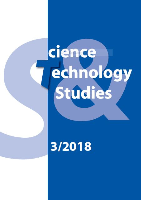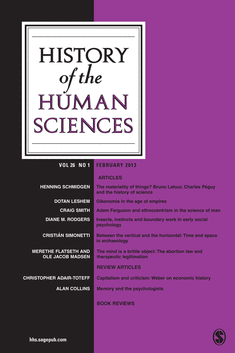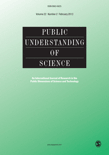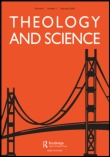
Science and Technology Studies
Scope & Guideline
Exploring the Nexus of Science and Society
Introduction
Aims and Scopes
- Interdisciplinary Approaches to Science and Technology:
The journal encourages research that integrates various disciplines, including sociology, anthropology, and philosophy, to analyze the implications of scientific and technological advancements. - Ethics and Governance:
A consistent focus on the ethical dimensions of technology and science, particularly how governance frameworks can address the societal impacts of emerging technologies. - Socio-Technical Systems:
Investigations into the interrelations between social factors and technological systems, emphasizing how societal practices and cultural contexts influence technological development. - Public Engagement and Citizen Science:
Research that explores the role of public participation in scientific endeavors, including citizen science initiatives and community-based research. - Historical and Cultural Contexts:
Analysis of the historical and cultural dimensions of science and technology, understanding how past developments shape current practices and beliefs.
Trending and Emerging
- Algorithmic Governance and Ethics:
There is an increasing focus on the ethical implications of algorithms and artificial intelligence, particularly how they shape governance and decision-making processes in various sectors. - Environmental and Ecological Technologies:
Research addressing the intersection of technology and environmental issues is on the rise, emphasizing sustainable practices and the role of technology in ecological mediation. - Digital Liberties and Security:
Emerging discussions around encryption, secure messaging, and digital rights are gaining prominence, reflecting societal concerns over privacy and data protection. - Citizen Science and Public Engagement:
The trend towards participatory research methodologies is growing, highlighting the importance of engaging the public in scientific inquiry and decision-making. - Health Technologies and Societal Impacts:
An increasing number of studies are exploring the implications of health technologies, particularly in relation to public health crises like COVID-19 and the ethics surrounding biomedical innovations.
Declining or Waning
- Traditional Models of Scientific Communication:
There is a noticeable decrease in research focused on conventional models of scientific communication, as newer, more collaborative and participatory models gain traction. - Purely Technological Determinism:
Studies that emphasize a strictly deterministic view of technology's impact on society are becoming less common, with a growing recognition of the nuanced interplay between technology and social factors. - Narrowly Focused Technological Innovations:
Research centered exclusively on specific technological innovations without considering broader societal implications is declining, as interdisciplinary approaches are favored. - Historical Case Studies:
While historical analysis remains important, the trend is moving towards integrating historical context with contemporary issues, reducing the frequency of standalone historical case studies. - Individualistic Perspectives on Science:
The focus on individual scientists' contributions is waning in favor of more collective and systemic analyses of scientific practices and knowledge production.
Similar Journals

Global Philosophy
Illuminating Contemporary Issues Through Global PhilosophyGlobal Philosophy, published by Springer, is a pioneering academic journal aimed at advancing the interdisciplinary dialogue within the field of philosophy on a global scale. With its dedicated ISSN 2948-1538 and E-ISSN 2948-152X, this journal provides a valuable platform for researchers and scholars to explore diverse philosophical traditions and contemporary issues affecting our interconnected world. As an Open Access publication, Global Philosophy ensures that cutting-edge research is readily accessible to a wide audience, fostering collaboration and innovation across disciplines. The journal encourages contributions that address both theoretical and practical implications of global philosophical inquiries, making it an essential resource for academics, professionals, and students committed to understanding the complexities of human thought in a global context. Engage with Global Philosophy and contribute to the evolving conversation on the myriad influences of global perspectives in philosophy.

HISTORY OF THE HUMAN SCIENCES
Highlighting the Intersections of History and ScienceHISTORY OF THE HUMAN SCIENCES is a prestigious journal published by SAGE PUBLICATIONS LTD, dedicated to advancing the field of human sciences through multidisciplinary scholarship. With an ISSN of 0952-6951 and an E-ISSN of 1461-720X, this journal has been a cornerstone of research since its inception in 1988 and continues to address significant themes in history and philosophy of science. The journal boasts an impressive Q1 ranking in both History and History and Philosophy of Science categories as of 2023, underlining its impact and relevance in the academic community. Although not an open-access journal, it provides a wealth of scholarly articles that encourage critical dialogue and foster innovative thinking among researchers, professionals, and students alike. Located in the United Kingdom, the journal is committed to exploring the complexities of human experience and knowledge across varied contexts, making it an essential resource for anyone dedicated to understanding the historical dimensions of science and its philosophical implications.

Foundations of Science
Delving into the Intersections of Science and PhilosophyFoundations of Science is a renowned academic journal published by SPRINGER, dedicated to the interdisciplinary exploration of both the historical and philosophical dimensions of science. Established in 1995 and based in the Netherlands, this journal has carved out a significant niche within the History and Philosophy of Science and Multidisciplinary fields, holding an impressive Q2 ranking in both categories as of 2023. The journal's rigorous peer-review process ensures the dissemination of high-quality research, supported by its Scopus rankings, which place it in the top 15% of its peer group in History and Philosophy of Science and the top 28% in Multidisciplinary studies. Although not an open-access journal, Foundations of Science remains accessible through various academic channels, making its vital contributions to the discourse surrounding scientific foundations available to a broad audience. By fostering dialogue across disciplines, it plays a crucial role in advancing the understanding of science's philosophical underpinnings and its historical development, making it an essential resource for researchers, professionals, and students alike.

History of science and technology
Fostering critical discourse on the evolution of science and technology.History of Science and Technology is an esteemed open-access journal published by SUIT Publishing, dedicated to advancing knowledge in the interrelated fields of history, science, technology, and their cultural implications. Since its inception in 2013, this journal has served as a vital platform for researchers, professionals, and students, fostering interdisciplinary dialogue and critical discourse on historical developments in science and technology. With an impressive reputation reflected in its 2023 Scopus rankings, where it ranks in the Q2 and Q3 quartiles across multiple related fields, it has positioned itself as a prominent resource in the academic community. The journal is particularly recognized for its contributions to archeology, museology, and the philosophy of science, making it essential reading for those engaged in these domains. Based in Kyiv, Ukraine, and operating under an open-access model, the History of Science and Technology aims to make high-quality research widely accessible, ultimately enriching the historical narrative and encouraging scholarly engagement across disciplines.

PUBLIC UNDERSTANDING OF SCIENCE
Exploring the Dynamics of Public PerceptionPUBLIC UNDERSTANDING OF SCIENCE, published by SAGE PUBLICATIONS LTD, stands as a crucial multidisciplinary journal dedicated to exploring the intricate relationship between science and society. With its well-established history from 1992 through to 2024, this journal offers an essential platform for researchers, professionals, and students interested in the communication of scientific knowledge and its impact on public perception. Recognized for its high academic standards, it proudly holds a Q1 ranking in the categories of Arts and Humanities, Communication, and Developmental and Educational Psychology, signifying its significant influence and contribution to these fields. The journal’s impressive percentile rankings further underscore its vital role in advancing scholarship, interaction, and understanding in the public discourse of science. Although it does not currently offer open access options, the journal is committed to disseminating scholarly research that informs and enriches the dialogue on critical scientific issues, making it a pivotal resource for anyone engaged in or studying the dynamics of science communication.

Theology and Science
Bridging Faith and InquiryTheology and Science is a leading journal that explores the intricate relationships between theological discourse and scientific inquiry, contributing to the growing dialogue in the fields of Religious Studies, History, and Philosophy of Science. Published by the reputable ROUTLEDGE JOURNALS, TAYLOR & FRANCIS LTD in the United Kingdom, this journal provides a platform for high-quality research, fostering multidisciplinary approaches and addressing the philosophical implications of scientific developments from a theological perspective. With an impressive 2023 impact factor placing it in the Q1 category for Religious Studies and Q2 for both History and Philosophy of Science and Multidisciplinary studies, Theology and Science is positioned to influence academic discourse and shape contemporary understanding. Researchers, professionals, and students alike will find valuable insights and thought-provoking articles that not only advance scholarship but also bridge gaps between these two vital fields of human understanding.

Metode Science Studies Journal
Connecting Ideas Across Time and DisciplinesMetode Science Studies Journal, published by UNIV VALENCIA, BOTANICAL GARDEN UV, is an esteemed open-access journal dedicated to advancing scholarly discourse in the fields of history and philosophy of science and multidisciplinary studies. Since its inception in 2013, the journal has positioned itself as a vital resource for researchers, professionals, and students, fostering an environment for innovative research and cross-disciplinary dialogue. Based in the vibrant city of Valencia, Spain, this journal aims to publish high-quality articles that explore the intricate relationships between scientific practices and philosophical inquiries. With a current impact factor demonstrating its relevance in the academic community, the journal is indexed in Scopus, ranking in the 52nd percentile for history and philosophy of science and the 33rd percentile for multidisciplinary studies. Scholars can access a breadth of research outputs that span from 2015 to 2024, thereby contributing significantly to the intellectual landscape of the respective fields.

Quantitative Science Studies
Empowering Insights Through Open Access KnowledgeQuantitative Science Studies is an esteemed open-access journal published by MIT Press, dedicated to advancing research and discourse in the fields of analysis, cultural studies, library and information sciences, and numerical analysis. Since its inception in 2020, the journal has rapidly ascended in stature, achieving a prestigious Q1 ranking across multiple categories in 2023, including being ranked #1 in both Cultural Studies and Mathematics Analysis. With an impactful presence characterized by a Scopus rank that places it in the top percentile of its categories, Quantitative Science Studies serves as an indispensable resource for researchers, professionals, and students seeking cutting-edge insights and methodologies. As an open-access journal, it ensures wide dissemination of knowledge, fostering accessibility and innovation within quantitative research landscapes. Located in the United States at ONE ROGERS ST, CAMBRIDGE, MA 02142-1209, this journal is poised to shape the future of quantitative studies and inspire the next generation of scholars.

Filosofskii Zhurnal
Unveiling the Rich Tapestry of Human ThoughtFilosofskii Zhurnal, published by the esteemed Russian Academy of Sciences - Institute of Philosophy, is a renowned academic journal focused on the vibrant fields of Philosophy, Cultural Studies, History and Philosophy of Science, and Linguistics. With an ISSN of 2072-0726 and an E-ISSN of 2658-4883, this esteemed publication has been a pivotal source of scholarly discourse since its inception in 2019, with converged years extending through 2024. Holding a distinguished Q2 quartile ranking in several disciplines, the journal is instrumental in advancing knowledge and research within its realms, making significant contributions to the understanding of philosophical thought, cultural dynamics, and language interpretation. Although it does not currently offer open access options, the journal maintains a strong presence in Scopus with notable rankings, including its position at #490/806 in Philosophy and #837/1304 in Cultural Studies. By providing a platform for original research, critical reviews, and interdisciplinary dialogue, Filosofskii Zhurnal serves as a valuable resource for researchers, professionals, and students seeking to deepen their understanding of philosophical inquiry and related fields.

GOVERNMENT INFORMATION QUARTERLY
Connecting Academia with the Future of Government InformationGovernment Information Quarterly, published by Elsevier Inc, is a premier journal that disseminates cutting-edge research in the fields of E-learning, Law, Library and Information Sciences, Sociology, and Political Science. With a notable impact factor reflecting its influence in the academic community, the journal consistently ranks in the Q1 category across these disciplines as of 2023, standing out in the top percentiles of global research. This journal, which has been contributing to the discourse on government information since 1984, serves as an essential resource for scholars, practitioners, and policymakers eager to understand the evolving intersection of information dissemination and governance. While it operates under a subscription model, its rigorous peer-review process ensures that published articles maintain the highest academic standards. Positioned in the United Kingdom, Government Information Quarterly advocates for innovative approaches to legal, societal, and informational challenges, making it a vital platform for interdisciplinary research and discussions.